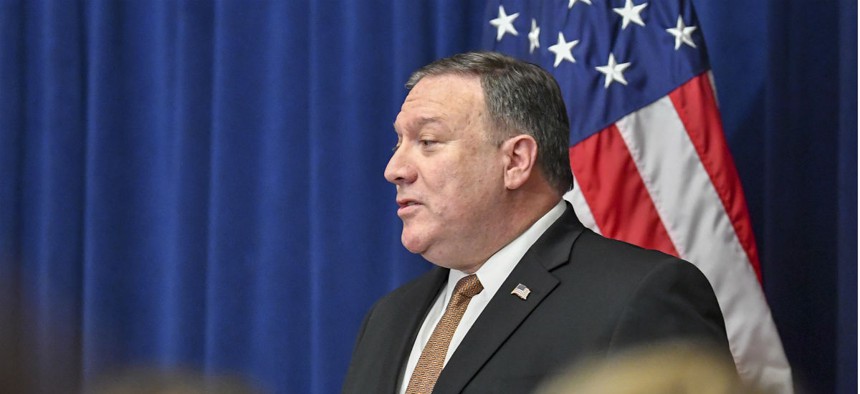
Secretary of State Mike Pompeo ended his predecessor's FOIA surge, which compelled hundreds of diplomats to perform work for which they were significantly overqualified. State Department
Pompeo Ends FOIA ‘Surge’ That Sidelined Hundreds of Diplomats
The transfers, which began under then-Secretary Rex Tillerson, were seen as retaliation for involvement in programs unpopular with the Trump administration.
In the latest sign of change in State Department management under Secretary Mike Pompeo, officials this week confirmed that the department has ended the practice of involuntarily transferring high-level career employees from specialized jobs to the office that handles Freedom of Information Act requests under what was an unusual “surge” to whittle down the backlog of FOIA requests.
Many career employees perceived the transfers, which began under then-Secretary Rex Tillerson, as a kind of banishment or retaliation for their involvement in programs supported by the Obama administration that had fallen from favor in the Trump administration.
A department spokeswoman on Friday confirmed to Government Executive that “many department employees assigned to assist with addressing the department’s FOIA backlog, including the majority of employees detailed to the FOIA Program, have returned to non-FOIA related duties.”
As reported by Talking Points Memo, the transfers affected hundreds of former ambassadors and top-level leaders of bureaus or the National Security Council. An Oct. 12 memo from State’s Bureau of Administration shared with the news outlet by a congressional source, described the FOIA transfers as a “tax” on all of State’s bureaus.
In a May article in the American Foreign Service Journal, retired diplomat Alex Karagiannis said the FOIA surge was “widely perceived as an exercise to drive people out by displacing them to tasks incommensurate with their diplomatic skills and experience, while higher priority national security objectives are underserved.”
State was named the lowest-performing agency in responding to FOIA requests in a 2015 study. But the latest annual report from State’s FOIA office showed that the backlog of unanswered requests had been reduced from 22,647 in fiscal 2016 to 13,008 in 2017.







